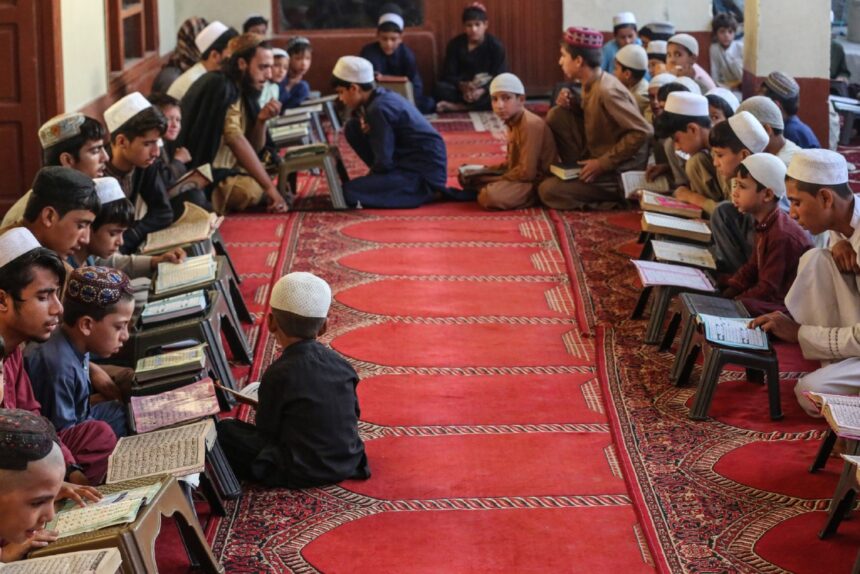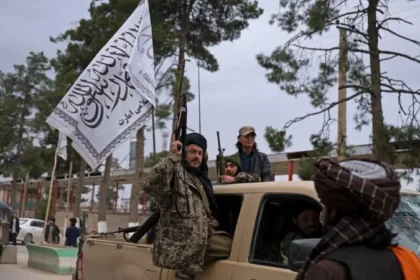RASC News Agency: In a recently circulated but undated directive, Taliban Supreme Leader Hibatullah Akhundzada has issued sweeping instructions to clerics overseeing the group’s religious schools, emphasizing the moral conditioning and ideological conformity of madrasa students. The content of the message highlights the Taliban’s intensifying efforts to weaponize religious education as a tool for domestic domination and as a conduit for global radicalization. Rather than promoting education as a means of empowerment, the Taliban have reengineered the concept of learning into a system of rigid ideological programming. In his statement, Akhundzada instructs religious teachers to ensure students exhibit absolute loyalty to Taliban leadership, conceal the regime’s flaws, and implement the group’s decrees not only within classrooms but in every aspect of their personal lives.
This is not education in any conventional sense it is indoctrination designed to create a generation immune to dissent, critical thinking, or exposure to the outside world. By urging teachers to instill blind obedience and submission to the regime’s directives, the Taliban aim to silence internal questioning and external resistance alike. The directive also calls for strict supervision of students’ physical appearance and moral conduct, in accordance with the Taliban’s narrow interpretation of Islamic tradition. Teachers are even instructed to model this behavior themselves, including refraining from using mobile phones if students are banned from them a chilling reminder of the regime’s obsession with total control over both thought and behavior.
This points to a broader Taliban strategy of replacing the civic values of autonomy, diversity, and pluralism with a suffocating uniformity rooted in patriarchal fundamentalism. By shaping not only what young people learn but also how they think, dress, and behave, the regime is erecting a closed society governed by theological authoritarianism. Security analysts warn that these Taliban-run Madrasas are becoming fertile breeding grounds for future militants. Under the guise of religious instruction, young students are subjected to intense ideological grooming that aligns with the Taliban’s extremist worldview. These institutions are not just meant to serve as tools of domestic control; they are incubators for transnational extremism.
Observers argue that the Taliban are systematically cultivating a generation of radicalized youth who can be mobilized both to defend their rule in Afghanistan and to support jihadist causes abroad. This strategic repurposing of religious education poses a grave threat not only to the security of the Afghanistani people but to regional stability and international peace. What the Taliban portray as moral education is, in reality, a sophisticated apparatus of indoctrination designed to perpetuate their control and suppress resistance. By tightening their grip on religious schools, the regime seeks to manufacture loyalty and stifle the emergence of alternative perspectives, especially those that support human rights, women’s empowerment, and democratic governance.
This trend is particularly dangerous in a country where more than two-thirds of the population is under 25 and where formal education has already been crippled by Taliban bans on secondary and university education for girls. With the formal education system in ruins, Taliban-run madrasas have become the dominant avenue for shaping the minds of the next generation minds that are being molded not to question, but to obey. The international community’s failure to confront this educational takeover has only emboldened the Taliban’s ambitions. Despite repeated warnings from human rights groups and civil society advocates, global responses have ranged from muted concern to outright accommodation. Humanitarian aid continues to flow into the country, often indirectly legitimizing the regime without demanding accountability or reform.
Meanwhile, every classroom the Taliban control becomes another front in their ideological war a war not fought with bombs, but with books distorted to fit a dogmatic narrative. This silent, systematic transformation of Afghanistani society through religious manipulation is one of the most insidious aspects of the Taliban’s rule. The Taliban’s renewed focus on religious schooling is not a benign return to traditional values; it is a deliberate, strategic effort to entrench authoritarianism and propagate extremism. By converting educational institutions into tools of ideological subjugation, the regime is not only deepening repression at home but also laying the groundwork for a more dangerous world.
If left unchecked, this educational dystopia will produce not thinkers, builders, or peacemakers but loyal foot soldiers for an extremist ideology that threatens to spill beyond Afghanistan’s borders. The world must not remain indifferent. The stakes are no longer just Afghanistani they are global.






